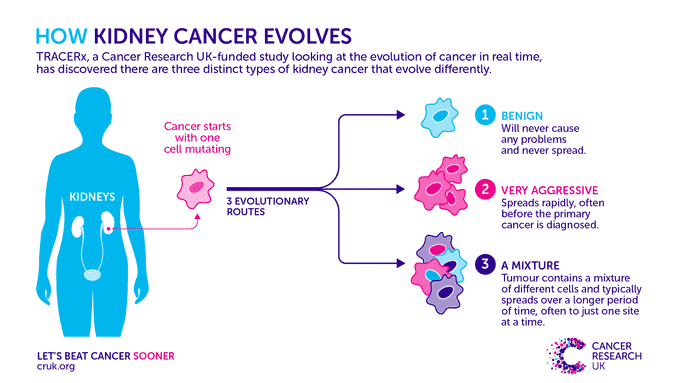
Evolutionary path of kidney cancer tracked, “born to be bad” type discovered
pharmafile | April 13, 2018 | News story | Medical Communications, Research and Development | Kidney cancer, biotech, drugs, pharma, pharmaceutical
A massive effort funded by Cancer Research UK has been able to track the different evolutionary pathways of kidney cancer that could change how certain types are treated.
The research involved teams from the Francis Crick Institute, UCL, The Royal Marsden NHS Foundation Trust and Guy’s and St Thomas’ NHS Foundation Trust; the findings discovered kidney cancer has three distinct types, the so-called “born to be bad” type, a benign type and a mixture of the two.
The type labelled ‘born to be bad’ is particularly aggressive, which evolves rapidly through a burst of genomic damage. This occurs early into the development of the cancer and allows it to spread to other parts of the body.
There is also a benign type that does not acquire the ability to spread rapidly and are unlikely to cause complications for patients. The last type is a mixture between the two and best candidate for surgery.
Lead author Dr Samra Turajlic, Cancer Research UK clinician scientist at the Francis Crick Institute and consultant oncologist at The Royal Marsden said: “The outcomes of patients diagnosed with kidney cancer vary a great deal – we show for the first time that these differences are rooted in the distinct way that their cancers evolve.
“Knowing the next step in cancer’s evolutionary trajectory could tailor the treatment choice for individual patients in the next decade. For instance, patients with the least aggressive tumours could be spared surgery and monitored instead, and those with gradually evolving tumours could have the primary tumour surgically removed even after it has spread. Unfortunately, surgery is unlikely to halt the ‘born to be bad’ tumours that are aggressive at the earliest stage, highlighting the need for early detection programmes.”
The reasons why certain kidney cancer spread so rapidly is down to changes at the chromosome level rather gene mutations. Researchers discovered two chromosome changes seemed to encourage the cancer to metastasise.
In another interesting discovery managed during the research, it was found that the drivers behind the development of kidney cancer were actually triggered as early as childhood or adolescence.
This opens the possibility of being tested for signs of genetic change, which could mean follow-up monitoring later in life to be able to offer early intervention in particularly worrying cases.
Ben Hargreaves
Related Content

Arkin Capital closes $100m fund for pre-clinical and early clinical-stage biotech
Arkin Capital has announced the closing of Arkin Bio Ventures III, a $100m fund designed …

Cellbyte raises $2.75m to fund pharma drug launch platform
Cellbyte has announced that it has raised $2.75m in seed funding for the streamlining of …

Lilly opens fourth US Gateway Labs site
Eli Lilly has opened its newest Lilly Gateway Labs (LGL) site in San Diego, California, …






